How to Find and Vet a Goat Rescue Near You to Adopt or Donate
Looking to adopt a goat or donate to a rescue? Learn how to find reputable goat rescues, spot red flags, and support animals that truly need help.
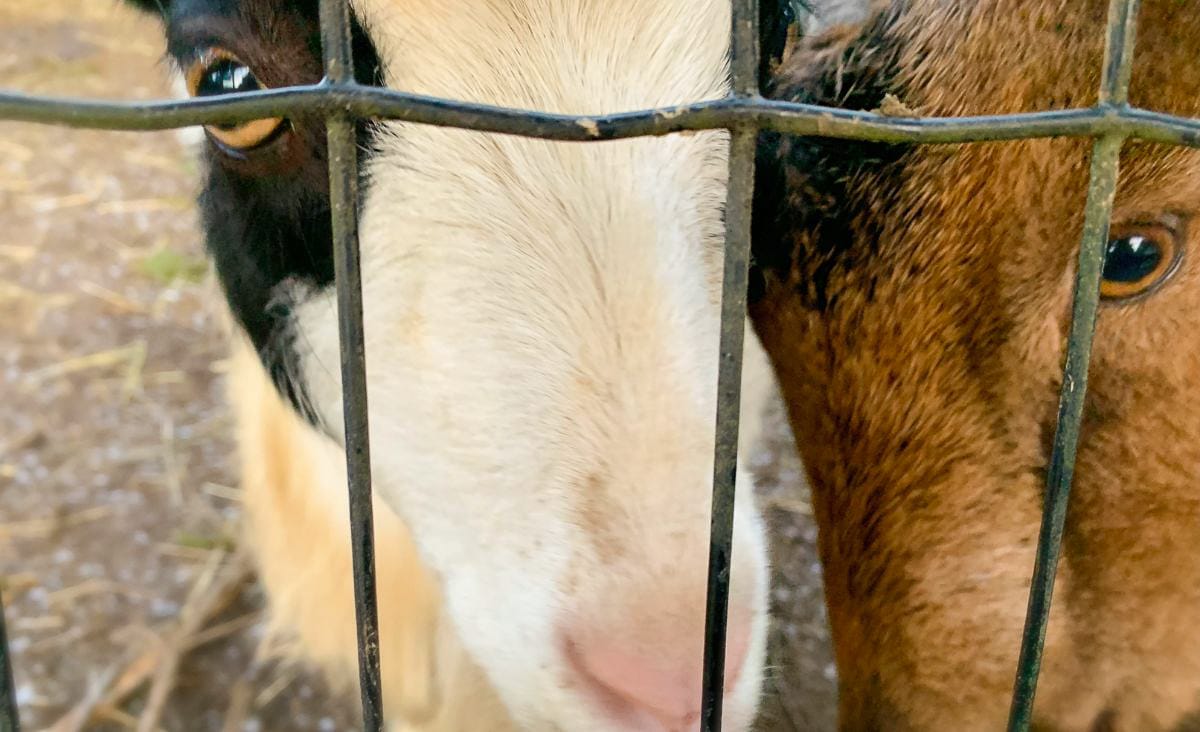
Not all goat rescues are created equal. It’s easy to assume that every group with a cute logo and a few emotional photos is doing right by their animals—but sadly, that’s not always the case. I’ve seen firsthand how misleading some “rescues” can be and how hard it is for well-meaning people to know who to trust. Whether you’re hoping to adopt a goat or donate to a rescue, doing a little homework up front can make a huge difference.
In this post, I’ll show you how to locate a goat rescue or rehoming group near you, how to evaluate their practices, and what red flags to watch out for. I’ll also walk you through what it’s like to adopt from a rescue so you can decide if it’s the right fit for your homestead. Plus, I’ll share a few reputable goat rescues I personally recommend and explain why ethical education—not judgment—is the most powerful way to create lasting change.
How to Find a Goat Rescue or Rehoming Group Near You
If you’re starting your search for a goat rescue or rehoming organization, the internet is a good place to begin—but it’s not the only place. Think of this process like sourcing any other animal for your homestead: it takes time, research, and a little common sense.
Start with These Search Phrases
Try using search terms like “goat rescue near me,” “adopt a goat in [your state],” “goat rehoming organizations,” or “farm animal rescue [your region]” to find leads online.
You should also check Petfinder and Adopt-a-Pet, as some rescues list their animals there. Local animal shelters are worth a call too—many have departments or partnerships for livestock adoption. Don’t forget about Facebook groups focused on farm animal rehoming; they’re a mixed bag, but occasionally you’ll find legitimate rescue listings there.
Check Their Website and Socials
Once you find a rescue, dig into their online presence. A trustworthy rescue should have a clear mission statement and share frequent updates about adoptable goats. Their website should explain adoption requirements, and ideally, include nonprofit status details. They should be transparent about where the animals come from and how they’re cared for.
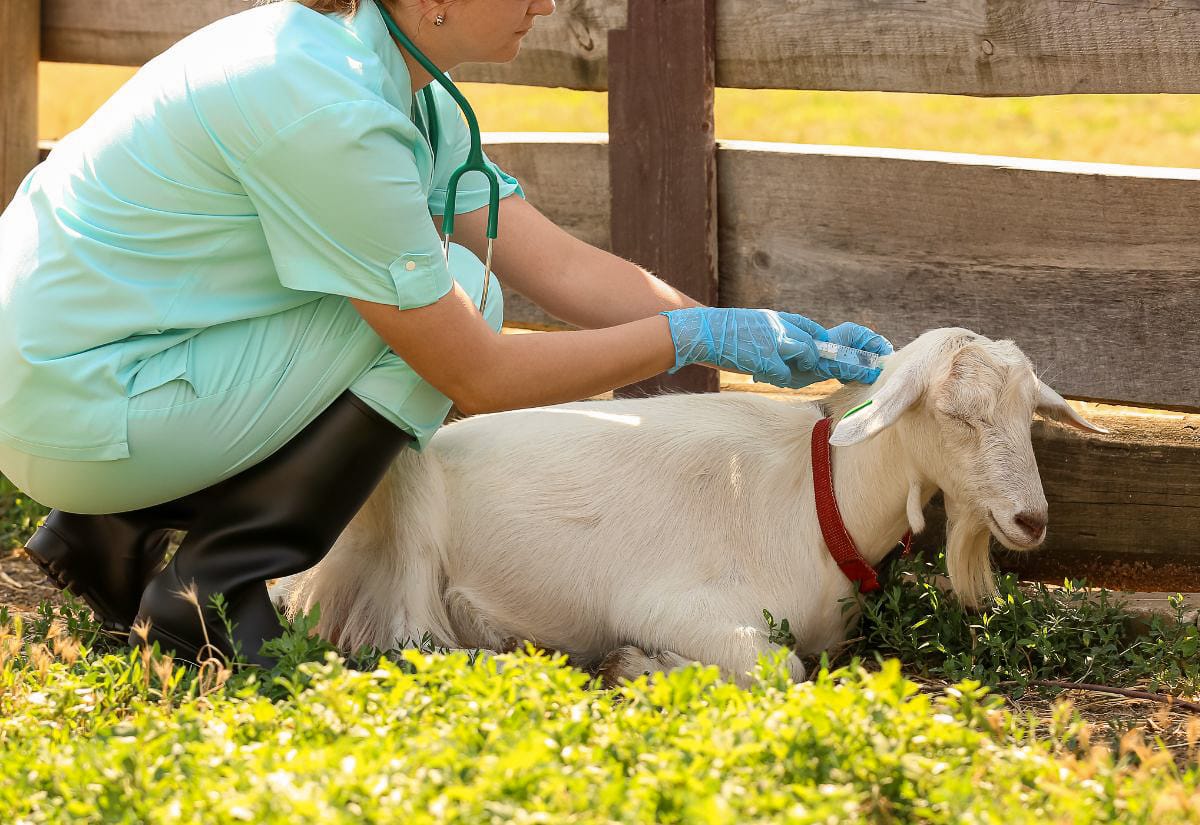
How to Vet a Goat Rescue Before You Donate or Adopt
Doing a little digging before you commit can help ensure your money—or your future goat—is going to the right place. Sadly, there are some individuals and groups who use the emotional appeal of “saving animals” without doing the work behind the scenes.
Ask These Questions
Are they a registered nonprofit? If not, that doesn’t mean they’re shady, but you’ll want to ask more questions. Are they actively rehoming animals, or do they keep them all indefinitely? Real rescues prioritize finding homes for healthy animals. Do they educate the public about livestock care and humane treatment? That’s a sign they’re working toward bigger-picture change. Lastly, how do they treat people? A rescue’s online tone and the way they interact with followers can be very telling.
I once unfollowed a rescue I used to admire after their message shifted from helping goats to attacking ethical farmers. When education is replaced with accusations, it’s time to walk away.
Quick Tips for Avoiding Red Flags
Pay attention to how the rescue presents itself. If every post is a plea for money with no follow-up about where it goes, that’s a concern. If none of the animals are ever adopted out, or if they use constant emotional manipulation without facts, it might not be what it claims. And if their social media is filled with finger-pointing, farm-bashing, or outright bullying, it’s best to steer clear.
What to Expect When Adopting a Goat from a Rescue
Adopting a goat is a meaningful and rewarding experience, but it comes with some unique expectations—especially when working with a rescue. Most rescues neuter all males before adoption and won’t adopt out intact animals unless they’re part of a sanctuary-style setup. You’ll also likely sign a contract outlining the kind of care, shelter, and fencing you’re required to provide. Many rescues will require that you adopt at least two goats or prove that you already have a herd, since goats don’t do well alone. In short, be ready for some rules—but also for the joy of giving a goat a second chance.
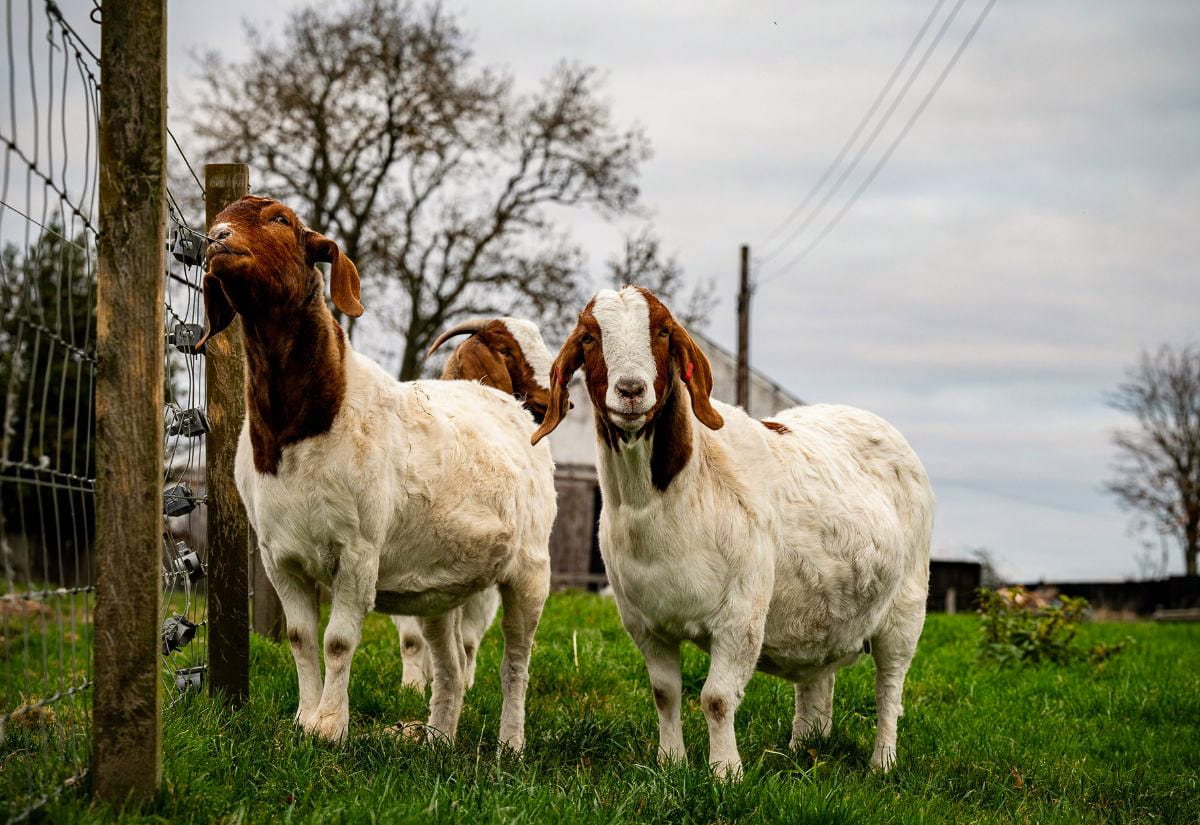
A Real-Life Example: The Goats of Anarchy Post
You may remember the viral Goats of Anarchy Instagram post that stirred up controversy back in 2017. While it has since been deleted, it painted all small farms with the same brush and implied that even ethical, small-scale farmers were supporting cruelty.
Today I joined @boochaces @freedomfarm_animalrescue and @afelice16 at a local livestock auction. It was without a doubt, the worst place I’ve ever been. Every animal was sick, stressed and terrified. There were dead bodies laying among the living like you see here. There were hundreds of motherless baby goats, lambs, piglets and calves. The animals were being whipped and kicked as they were auctioned. They were screaming, being trampled and being thrown around like garbage. There were cries of fear and agony. This is not a factory farm, but a local auction for small farmers. This is where “humane meat” comes from. What these babies will endure over the next couple of days is unimaginable torture. I think of all of our babies when I look at them. They are sweet, innocent and they want to live. This is where the baby boys from dairy farms end up because they cannot produce milk. This is where older moms end up because their bodies are used up. It is time to open our eyes and stop living with blinders on. Is this really worth your meat and dairy? Is it?
A post shared by Goats of Anarchy (@goatsofanarchy) on Aug 28, 2017 at 9:49am PDT
I shared my thoughts at the time:
I’m in no way supporting auctions. I feel people should meet the farmer and checkout where the animal was being raised, but things like this post perpetuate misleading information about small, humane farms. As a rescue and a not-for-profit, it’s your responsibility to teach the truth. I know you’re a vegan, but you can’t go around under the guise of a goat rescue, attacking people who have different views from your own. That’s exactly what you continue to do.
As you can imagine, daggers were thrown in my direction. One individual even quoted Bambi and then called me a pathetic excuse for a human being in the same breath. Thankfully a lot of amazing farmers and homesteaders spoke up not only in my defense but also in their own defense. All of that led to this…
We need to uplift ethical practices—not tear down others trying to do right by their animals.
Goat Rescues I Trust
These organizations are doing it right:
- Puget Sound Goat Rescue – 100% volunteer-run, over 1,900 goats saved.
- Farm Sanctuary – The nation’s largest farm animal adoption network.
- Sanctuary One – A peaceful home for disabled, elderly, or emotionally traumatized animals.
- Happy Trails Farm Animal Sanctuary – Rescues in collaboration with law enforcement.
- Your Local 4-H Chapter – Especially their Ag Literacy programs.
If you know of another reputable goat rescue, drop it in the comments! I’ll vet them and add it to the list.
Goat Rescue Questions You Might Still Have
Pin now—use it later when you’re ready to adopt or donate.
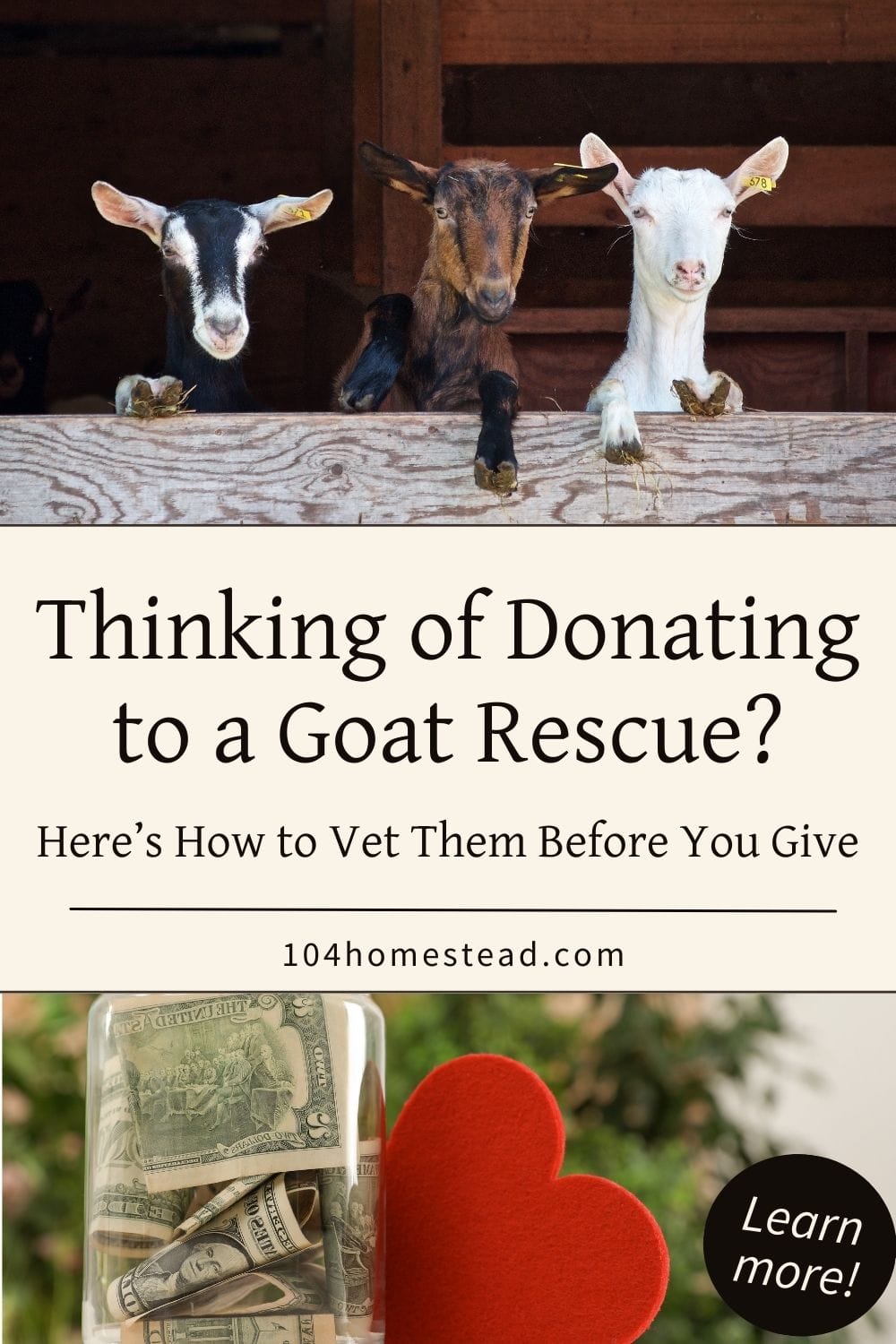
Adopting a goat—or donating to a rescue—is a powerful act of compassion. But it’s also one that deserves a little research. Not every rescue is doing it right, and not every “sad story” is a sign of true need.
If you’re committed to goat rescue and rehoming, do your homework. Find the folks making a real difference, and lend your voice—and dollars—to their mission.
Have you ever adopted from a livestock rescue? Know a goat in need? Drop your story below—I’d love to hear it.
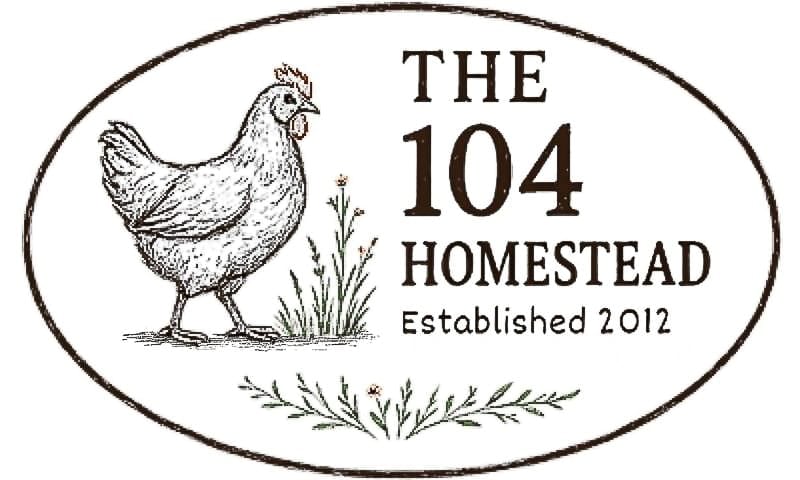




I loved the topic you wrote on. It was an amazing ride of some great work.
Thank you for this article. I have been on the fence about supporting G.O.A. as I follow them on Instagram and have been pretty irritated with the vegan soap box she frequently gets on and her constant asking for donations, despite having been featured in articles in publications such as USA today, People and the like. It just seems…off to me. We are homesteaders as well and I appreciate this article in that it leads a more seemingly honest discussion about rescues, homesteads and the like.
This is a wonderful post. It is thoughtful, insightful, and offers up some wonderful suggestions for organizations that actually do what they say they do.
Thank you so much Connie 🙂
One life at a time animal rescue in Pennsylvania. ?
Thank you Lisa! I’ll take a look at them.